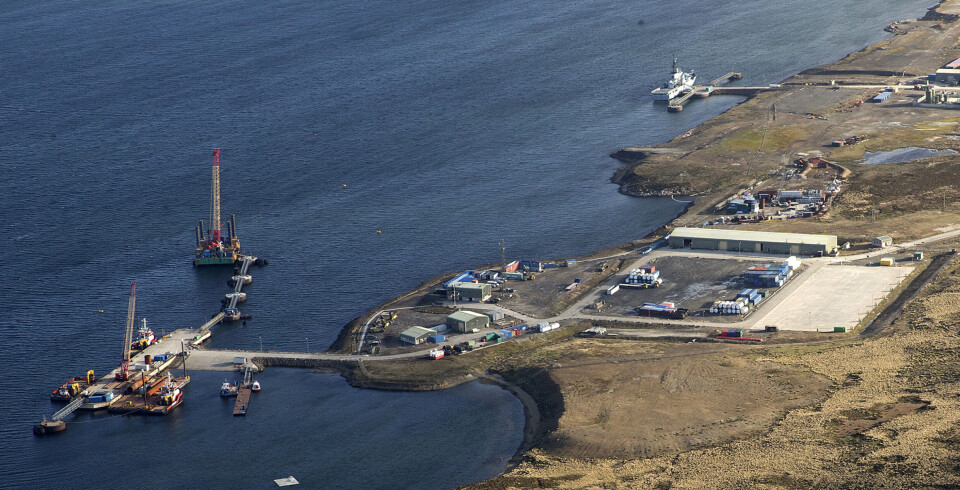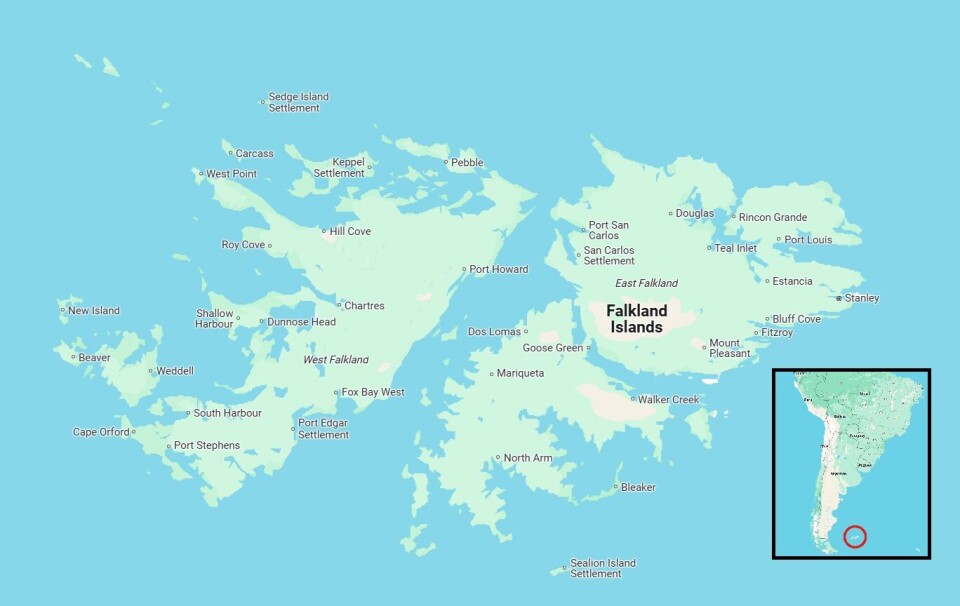
Plan to grow 50,000 tonnes of salmon in the Falkland Islands
Joint venture company hoping for government go-ahead after public consultation
The Falkland Islands could become the newest frontier in salmon farming if a proposal currently before the Falkland Islands Government (FIG) is approved.
Geographically, the archipelago in the South Atlantic bears similarities to well established salmon farming regions, such as the Faroes, Shetland, and Orkney, with sheltered bays and Norwegian style fjords, and consistently cool sea water temperatures.
The company behind the plans, Unity Marine – a joint venture between Falklands fishing firm Fortuna and Danish aquaculture consultant F-Land ApS, has measured currents and waves across the islands to locate the most suitable sites and will base its headquarters in the capital, Stanley.
An ongoing public consultation, expected to deliver its findings later this year, follows an earlier scoping exercise and will take into consideration the economic benefits and environmental impact of the development, along with stakeholder views.
If the government decides salmon farming is viable in the Falklands, licences could be issued on a case-by-case basis, although Unity Marine is believed to be the only enterprise considering setting up a farming operation at present.

In a press release, the company said it is planning to spend £5 million on the exploration phase alone, of which more than 50% will be invested locally.
Unity Marine managing director James Wallace said if given the go-ahead, the ambition is to eventually produce 50,000 tonnes of Atlantic salmon, using the latest technology, sustainable production methods, and aspiring to ASC (Aquaculture Stewardship Council) certification.
“We are asking the FIG to introduce enabling legislation, as it has for the hydrocarbons industry, and then we, or other interested parties, could apply for licences, judged on individual merit and subject to environmental impact assessments,” said Wallace.
“The Falklands are ideally suited to salmon farming and a vibrant sector would diversify the economy, contribute to the public purse through taxes and licence fees, and help create future security and prosperity for the community.
“The Islands have a history rooted in farming, sealing, and now fishing, but the government has recently announced it will incur a heavy debt for necessary infrastructure for the first time, and finding an alternative source of revenue to the squid fisheries has become even more critical.”
Two smolt facilities
Unity Marine’s plans include eight farm sites, between 3-7km from the shoreline, on either side of the largest island, East Falkland, where the Mount Pleasant military base is located and which, like West Falkland, is sparsely populated. The Falkland Islands have a permanent population of just 3,500 people.
Two recirculating aquaculture system (RAS) smolt facilities will be built in East Falkland, one at Mare Harbour, near the Mount Pleasant, and one at Newhaven, on the west coast of East Falkland.
The farm set-up will be conventional, with a feed barge for remote feeding, and Fortress pens, like those used in Tasmania, with anti-predator nets to keep out sea lions.
Ova and feed will be imported, and the company will install two wind turbines to generate renewable power, plus a generator for when the wind doesn’t blow, and is also considering the potential for solar as part of future solutions.
Career incentives
“Long term investment in Camp (the Falklands term for any area outside of Stanley) has been a focus of recent Legislative Assemblies because there has been depopulation and not enough financial opportunities,” said Wallace.
“Salmon farming, and its supporting supply chain, would not only boost GDP but provide career incentives for young islanders to return home after international studies, much as young Faroese return from studying in Denmark to work in their flourishing fish farming industry.
“Our recent discussions with stakeholders reflected a cross-section of local sentiment, with some vocal opposition countered by a more traditional Falklands outlook, which sees natural resources, used responsibly, as the lifeblood of our remote nation.”























































